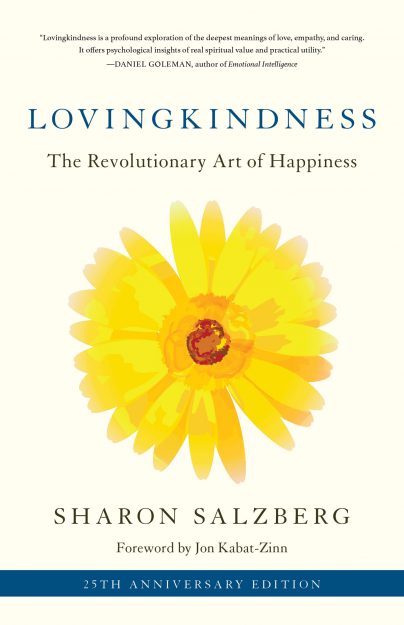When we are held prisoner by our own past actions, or the actions of others, our present life cannot be fully lived. The resentment, the partially experienced pain, the unwelcome inheritance we carry from the past, all function to close our hearts and thereby narrow our worlds.
The intention of forgiveness meditation is not to force anything, or to pretend to anything, or to forget about ourselves in utter deference to the needs of others. In fact, it is out of the greatest compassion for ourselves that we create the conditions for an unobstructed love, which can dissolve separation and relieve us of the twin burdens of lacerating guilt and perpetually unresolved outrage.
It is not so easy to access that place inside of us which can forgive, which can love. To be able to forgive is so deep a letting go that it is a type of dying. We must be able to say, “I am not that person anymore, and you are not that person anymore.”
Forgiveness does not mean condoning a harmful action, or denying injustice or suffering. It should never be confused with being passive toward violation or abuse. Forgiveness is an inner relinquishment of guilt or resentment, both of which are devastating to us in the end. As forgiveness grows within us, it may take any outward form: we may seek to make amends, demand justice, resolve to be treated better, or simply leave a situation behind us.
The sense of psychological and spiritual well-being that comes from practicing forgiveness comes directly because this practice takes us to the edge of what we can accept. As you do the reflections, many conflicted emotions may arise: shame, anger, a sense of betrayal, confusion, or doubt. Try to allow such states to arise without judging them. Recognize them as natural occurrences, and then gently return your attention to the forgiveness reflection.
Sit comfortably, close your eyes, and let your breath be natural and uncontrolled. Begin with the recitation (silent or not, as you prefer): “If I have hurt or harmed anyone, knowingly or unknowingly, I ask their forgiveness.” If different people, images, or scenarios come up, release the burden of guilt and ask for forgiveness: “I ask your forgiveness.”
After some time, you can offer forgiveness to those who have harmed you. Don’t worry if there is not a great rush of loving feeling; this is not meant to be an artificial exercise, but rather a way of honoring the powerful force of intention in our minds. We are paying respects to our ultimate ability to let go and begin again. We are asserting the human heart’s capacity to change and grow and love. “If anyone has hurt or harmed me, knowingly or unknowingly, I forgive them.” As different thoughts or images come to mind, continue the recitation, “I forgive you.”
In the end, we turn our attention to forgiveness of ourselves. If there are ways you have harmed yourself, or not loved yourself, or not lived up to your own expectations, this is the time to let go of unkindness toward yourself because of what you have done. You can include any inability to forgive others that you may have discovered on your part in the reflection immediately preceding—that is not a reason to be unkind to yourself. “For all of the ways I have hurt or harmed myself, knowingly or unknowingly, I offer forgiveness.”
Seeing Goodness
Since the proximate cause, or most powerful conditioning force, for metta to arise is seeing the good in someone, we make an effort to turn our attention to any good we can find in a difficult person.
The first time I was given the instruction to look for one good quality in a person I found difficult, I rebelled. I thought, “That’s what superficial, gullible people do—they just look for the good in someone. I don’t want to do that!” As I actually did the practice, however, I discovered that it had an important and powerful effect. In fact, it was doing just what it was supposed to do: looking for the good in someone did not cover up any of the genuine difficulties I found with that person, but allowed me to relate to them without my habituated defensiveness and withdrawal.
There may be people who absolutely defy our ability to think of even one good thing about them. In that case, focus on the universal wish to be happy, which this difficult person also shares. All beings want to be happy, yet so very few know how. It is out of ignorance that any of us cause suffering, for ourselves or for others.
The Difficult Person
As we come to sending metta to a person with whom we experience conflict, fear, or anger, we can reflect on this line from Rainer Maria Rilke: “Perhaps everything terrible is in its deepest being something that needs our love.”
It is useful to begin with someone with whom the difficulty is relatively mild—not starting right away with the one person who has hurt us the most in this lifetime. When I was first practicing metta in Burma, I received the instruction to send metta to a benefactor repeatedly, for about three weeks. The whole time I was frustrated, thinking, “Why am I spending all this time sending metta to someone I already love? That’s easy—I should be sending metta to my worst enemy. That’s the only kind of love that really counts.” I expressed some of this to U Pandita, who laughed and said, “Why do you want to do things in the hardest way possible?” This practice is not meant to induce suffering, though it may reveal it. If a particular person has harmed us so grievously that it is very difficult to include them in the field of our loving care, then we approach sending them metta slowly, with a lot of care and compassion for ourselves.
In order to begin to develop metta toward a person with whom we have problems, we must first separate our vision of the person from the actions they commit that may upset or harm us. In developing metta, we put aside the unpleasant traits of such a being and try instead to get in touch with the part of them that deserves to be loved.
Perhaps you can most easily feel metta for the person if you imagine them as a vulnerable infant, or on their deathbed (but not with eager anticipation—be careful). You should allow yourself to be creative, daring, even humorous, in imagining situations where you can more readily feel kindness toward a difficult person. As the strength of our metta grows, we can eventually reach a place where we sincerely extend wishes of well-being to the difficult people in our lives, even while we work to counter their actions and activities of which we disapprove.
Sit comfortably, and start with directing the metta phrases toward yourself, enveloping yourself with your own loving care. After some time, direct the phrases toward a benefactor, then a friend. If you have found a neutral person, you can then include them. You should turn your attention to the difficult person only after spending some time sending metta toward yourself and to those you find it relatively easy to feel metta for. If you can, contemplate one good thing about them. If you can’t, remember that this person, just like ourselves, wishes to be happy, and makes mistakes out of ignorance. If saying, “May you be free from danger, may you be happy,” brings up too much fear or sense of isolation for you, you can include yourself in the recitation: “May we be free from danger. May we be happy.”
Gently continue to direct metta toward the difficult person, and accept the different feelings that may come and go. There may be sorrow, grief, anger—allow them to pass through you. If they become overwhelming, go back to sending metta to yourself or a good friend. You can also try to hold those feelings in a different perspective. A classic one is to ask yourself, “Who is the one suffering from this anger? The person who has harmed me has gone on to live their life, while I am the one sitting here feeling the persecution, burning, and constriction of anger. Out of compassion for myself, to ease my own heart, may I let go.”
Another reflection is done by turning your mind to the suffering of the difficult person, rather than viewing their actions only as bad or wrong. When we feel anger, fear, or jealousy, if we feel open to the pain of these states rather than feeling disgraced by their arising, then we will have compassion for ourselves. When we see others lost in states of anger and fear, and we remember how painful those states are, we can have compassion for those people as well.
When you can, return to directing the metta phrases toward the difficult person. You can go back and forth between yourself, a friend, the reflections, and the difficult person.
You may find yourself expressing greater lovingkindness in actual life situations before you experience a greater depth of loving feeling in your formal meditation practice. Sometimes in difficult encounters there is more patience than before, more willingness to listen than before, and more clarity than before.
Be patient with yourself in this practice, and try not to hold rigid expectations of what you should be experiencing. When we have rigid expectations, we can feel a great sense of helplessness if those expectations are not quickly met. We see our actions as being fruitless, not going anywhere, and we get lost in contempt or self-condemnation. We can always return to the intention to care for ourselves and for all beings.
Beginning again and again is the actual practice, not a problem to be overcome so that one day we can come to the “real” meditation.

♦
From Lovingkindness by Sharon Salzberg © 1995 by Sharon Salzberg. Reprinted in arrangement with Shambhala Publications, Inc. Boulder, CO.
Thank you for subscribing to Tricycle! As a nonprofit, we depend on readers like you to keep Buddhist teachings and practices widely available.
